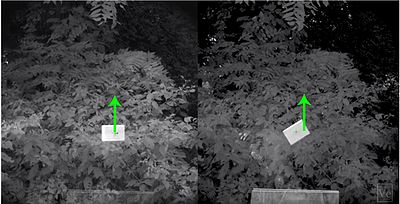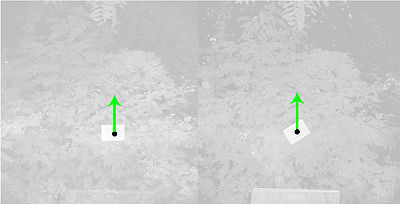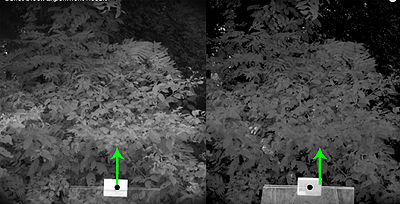Multi-particle Analysis of Momentum
claimed by nacharya7
The Main Idea
The Momentum Principle is a foundation of classical physics that is applicable to almost any system of objects at any scale, micro- or macroscopic. As such it can be used to analyse systems of point particles as well as multi-particle systems; however, there are a few subtleties one needs to take note of when choosing to analyze a multi-particle system that this page will detail.
A Mathematical Model
The Momentum Principle is [math]\displaystyle{ {\frac{d\vec{p}}{dt}}_{system} = \vec{F}_{net} }[/math] where p is the momentum of the system and F is the net force from the surroundings.
The Energy Principle is [math]\displaystyle{ {Δ{E}} = {W} }[/math] where E is the total change of a system's energy ans W is the work done on the system by the surroundings.
You will also need to know how to find the center of mass: [math]\displaystyle{ {cm} = {\frac{\sum{mr}}{{M}_{tot}}} }[/math], where cm is the location of the center of mass relative to an origin, mr is a fractional mass and length product summed up to infinity, and M is the total mass of the system.
Procedure
In order to analyze the motion of a multi-particle system, we need to apply both the energy principle and momentum principle.
Step 0: Identify the system and the surroundings of the system.
Step 1: Compress the system into a point-particle located at the system's center of mass.
[insert image later]
Step 2: Apply all forces acting on the system with their tails connected to the center of mass, retaining direction and magnitude.
[insert image later]
Step 3: Use the energy principle on the point particle.
[math]\displaystyle{ Δ{K} = Δ{W}_{trans} = \vec{F} * Δ{r}_{cm} }[/math]
Step 4: Return to the real-system and visualize the initial and final states of the systems.
[insert images]
Step 5: Calculate the work that each force does
Step 6: Set up the Energy Principle for the problem.
[math]\displaystyle{ Δ{K}_{trans} + Δ{K}_{rot} + Δ{U} = {W}_{surr} + {Q} }[/math]
Examples
Problem Description
Two wooden blocks of mass [math]\displaystyle{ {\vec{m}} }[/math] are shot by a bullet on a vertical apparatus such that the first wooden block along the axis of its center of mass while the other is hit slightly to the left. The bullet travels at speed [math]\displaystyle{ {\vec{v}} }[/math]. Which block travels further?

Solution
Step 0: System: Block, Bullet Surroundings: Earth
Step 1:
Compress block to point-particles centered at center of mass.
Step 2: Apply all forces to point particle (gravity as well)

[math]\displaystyle{ {F}_{net,1} = {{d}{\vec{p}} / {dt}} + {mg} = {F}_{net,2} }[/math]
Step 3: Apply Energy Principle to this case.
[math]\displaystyle{ {K}_{trans} = {W}_{surr} = {F}_{net} * {r}_{cm} }[/math]
From here we see that the translational kinetic energy for both blocks is the same, meaning they travel the same vertical distance, however by following through in our analysis we can see why this counter-intuitive answer is such.
Step 4: Find the initial and final states of the real system.
Step 5: Each block goes up height [math]\displaystyle{ {h} }[/math], therefore
[math]\displaystyle{ {W}_{surr} = ({F}_{net,1} + {F}_{net,2}) * {r}_{cm} }[/math]
Step 6: After complete analysis of the system we see that the two blocks have the same translation kinetic energy, however the spinning block has rotational energy, while the non-spinning block gains thermal energy. Block 1: [math]\displaystyle{ {K}_{trans} + {E}_{therm} = {W}_{real} }[/math] Block 2: [math]\displaystyle{ {K}_{trans} + {k}_{rot} + {E}_{therm,2} = {W}_{real} }[/math]
Connectedness
- This multi-particle analysis is widely used in applied physics to solve a variety of problems. It goes beyond the energy and momentum principles in application, and by increasing the accuracy of the measurements in the analysis, one can predict future motion to a very accurate degree. This is interesting because simply by seeing what forces act on an object in one instant, we can see the future of the object. In particular, this system can be used to calculate astronomical figures related to astronomy. Seeing how collisions can change the trajectory of planets and asteroids, or how the gravitational force of massive objects pull in smaller planets require multi-particle analysis.
- As a Computer Science major, I have an entire branch of my field dedicated to creating near-perfect models of systems in virtual space. Creating algorithms to represent these models and building machines that can handle the amount of resources these models drain is an on-going pursuit. At the moment, we have models that can predict motion to an indescribable degree of accuracy, but due to machine memory problems, we can't represent these models as perfect simulations.
- Industrial applications of multi-particle analysis can be found everywhere, from the engineering of liquid interfaces to the creation of video game physics engines. This "multi-particle approach" goes way beyond just being a concept of physics: it is how modern physics works.
See also
Further reading
Chabay, Ruth W., and Bruce A. Sherwood. Matter & Interactions. Hoboken, NJ: Wiley, 2011. Print.
References
Veritasium. "Bullet Block Explained!" YouTube. YouTube, 30 Aug. 2013. Web. 05 Dec. 2015.

